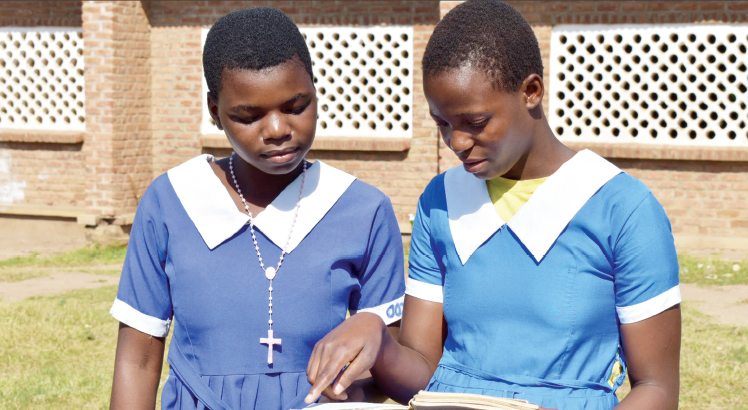Over the years, pupils at Phanga Catholic Primary School in Nsanje have found it hard to learn during the rainy season.
Tucked at about 200 metres from the Shire River at the Southern tip of Malawi, the school, in Mkango Village, Traditional Authority (T/A) Tengani, has some of its classrooms flooded annually.
This has been forcing authorities to close the school for the safety of learners.
One of them, Omega Chinandidya, says this has been frustrating their right to education.
Omega (L) with her schoolmate
“When the rainy season comes, we know that we will stay home even if it is time to go to school. There are delays to open and unplanned closures of school due to floods,” says the Standard Eight learner.
Teachers and learners always have to wait for days or weeks to start lessons even after floodwaters have receded.
The 15-year-old girl says this has made them fail to complete syllabuses.
The unfortunate development has become common with rampant environmental degradation that increased the school’s vulnerability to devastating disasters, according to the head teacher, Alfred Matiki.
He says the closures have been long as the school also provides refuge to households affected by floods in T/A Tengani.
“We provide shelter to survivors of the disasters from group village heads [GVHs] Mkango, Chumbu and Sifa. This makes us close for almost two months and sometimes, we do not know when we will open the school,” says Matiki.
The closures affect the learning of 986 pupils at the school opened in 1957 and contribute to high dropout rate among children, resulting in rising cases of early marriages and pregnancies.
When Tropical Storm Ana-induced floods hit on January 24 this year, Omega says her access to education was disrupted.
It was just a week before she sat for Chigumukire Zone’s Primary School Leaving Certificate of Education (PSLCE) mock examinations.
“Experiencing the disaster disturbed my life,” she recalls. “The two-week closure of school also affected my preparations such that I failed the mock exams when we resumed classes.”
Society for Research in Child Development reports that children who have experienced a natural disaster may suffer long-term physical, psychological and educational deficits.
It adds that they also experience depression symptoms such as feeling sad or losing interest in activities, and symptoms of anxiety such as fear and worries about safety.
Apart from those concerns, Omega and her Standard Eight peers were worried that they could not finish the syllabus.
“Like other learners before us, we were to sit for the national examinations without completing the syllabus. This could put us at a disadvantage,” she laments.
However, all 37 learners are now well equipped for this year’s PSLCE examinations scheduled to start on July 13, having done the syllabus in time.
Matiki attributes the development to accelerated teaching skills that teachers got from Education in Emergencies Project being implemented by Oxfam in Malawi in partnership with Plan International Malawi.
The skills are part of interventions in the European Union Civil Protection and Humanitarian Aid-funded project meant to ensure education is not disrupted when disasters strike.
Teachers delivered lessons in accelerated mode that helped learners to catch up and have more time for revisions after covering the whole syllabus.
Omega, who dreams of becoming a nurse, is certain that she will make it to Nsanje Secondary School.
“I recovered psychologically and learned everything. The project has improved my academic performance for the better,” she states.
The project that targets 40 schools in Nsanje, Phalombe, Chikwawa and Lilongwe also provided resources to disaster-hit households for children to buy school materials.
Phanga Catholic Primary School Mother Group chairperson Sinoliya Stephano says the initiative helped them to keep girls in school.
She says apart from providing reusable sanitary pads for them not to miss classes, the move increased girls’ retention rate when the school reopened.
In Chikwawa, Konzere Zone primary education adviser Gerald Pengapenga commends the project for reducing school dropout rate from 19 to 10 percent.
“We are also pleased with increased pass rate for girls,” he says.
The post Promoting education amid disasters appeared first on The Nation Online.
 Moni Malawi
Moni Malawi 
